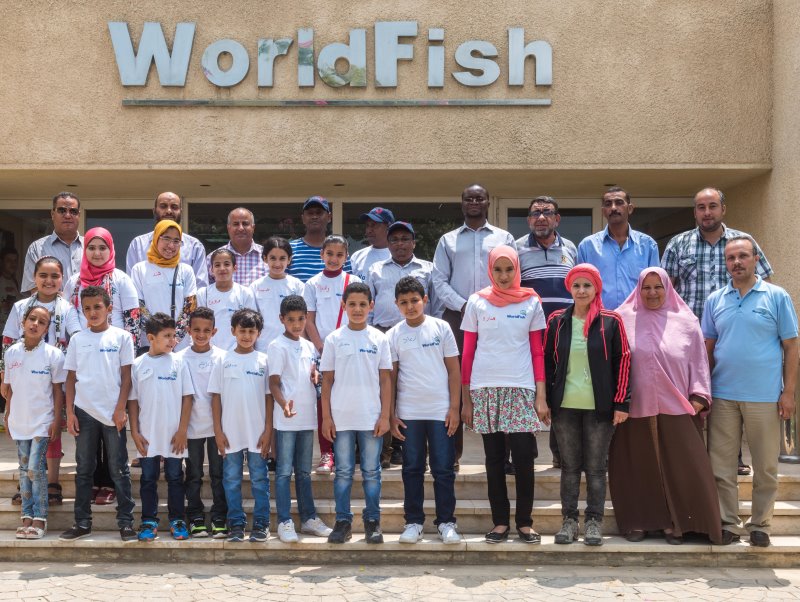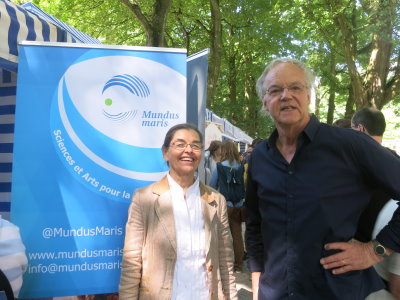 Nuestro océano, nuestro futuro - el lema de este año del Día Mundial de los Océanos - inspiró el stand de Mundus maris en el festival ambientalista en el Parque del Cincuentenario de Bruselas, Bélgica, el 4 de junio. Este fue también el inicio de toda una serie de eventos y actividades organizados por Mundus maris y sus socios en diferentes países de África, Europa y América Latina.
Nuestro océano, nuestro futuro - el lema de este año del Día Mundial de los Océanos - inspiró el stand de Mundus maris en el festival ambientalista en el Parque del Cincuentenario de Bruselas, Bélgica, el 4 de junio. Este fue también el inicio de toda una serie de eventos y actividades organizados por Mundus maris y sus socios en diferentes países de África, Europa y América Latina.
Los temas centrales de las conversaciones fueron la sobrepesca, la contaminación, el cambio climático y, sobre todo, lo que podemos hacer juntos.
1. Sobrepesca
La sobrepesca es hoy en día probablemente la principal amenaza para el océano y sus ecosistemas. Un estudio reciente - el más exhaustivo sobre el estado de 397 poblaciones en aguas europeas - demostró que el 85% de las poblaciones de peces y mariscos en dichas aguas están actualmente por debajo de niveles saludables. Pero el estudio también demostró que, si logran recuperarse, las pesquerías podrían cosechar 57% o cinco millones de toneladas más de una manera sostenible. Clique aquí para más información.
El panorama es particularmente sombrío en el Mediterráneo, donde las poblaciones están tan agotadas que no pueden producir en ninguna parte cerca de las capturas altas y sostenibles que la Política Pesquera Común Europea (PPC) reformada exige. La protección urgente y la reducción de la mortalidad por pesca son esenciales para permitir la recuperación. La buena noticia es que es posible lograrlo, como hemos escuchado durante una reciente audiencia en la Comisión de Pesca del Parlamento Europeo.
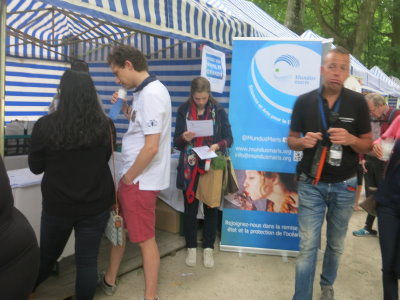 En otras partes del mundo también hay algunos indicios de que la recuperación se está llevando a cabo, pero los informes incompletos de los gobiernos envian a la Organización de las Naciones Unidas para la Agricultura y la Alimentación (FAO) hacen difícil, incluso para las personas que trabajan en el sector, tener una información realista. No obstante, la disminución del tamaño de las capturas y el tamaño de los peces en muchas de estas capturas, la mala salud económica de muchas operaciones de pesca son indicadores de la urgente necesidad de reforma. Una cuestión particularmente desagradable son los todavía muy altos niveles de pesca ilegal, no declarada y no reglamentada (pesca INN), particularmente en las aguas de los países en desarrollo, por ejemplo en África occidental. En nuestra reciente presentación en la Conferencia de EGU, argumentamos que se trata de prácticas criminales de sindicatos que operan internacionalmente y que no pueden entenderse y abordarse como gestión ordinaria de la pesca. De hecho, se han convertido en el foco de una nueva línea de trabajo de Interpol. También discutimos fuertemente para golpear a los defraudadores donde duele, en negar el acceso a los mercados ricos en Europa y otros países y regiones ricos para realizar sus beneficios ilícitos. Impulsar el monitoreo, el control, la vigilancia y la aplicación de la ley en los países en desarrollo sería otro pilar para frenar las prácticas criminales y una inversión lucrativa para los países con recursos limitados para financiar los esfuerzos de desarrollo.
En otras partes del mundo también hay algunos indicios de que la recuperación se está llevando a cabo, pero los informes incompletos de los gobiernos envian a la Organización de las Naciones Unidas para la Agricultura y la Alimentación (FAO) hacen difícil, incluso para las personas que trabajan en el sector, tener una información realista. No obstante, la disminución del tamaño de las capturas y el tamaño de los peces en muchas de estas capturas, la mala salud económica de muchas operaciones de pesca son indicadores de la urgente necesidad de reforma. Una cuestión particularmente desagradable son los todavía muy altos niveles de pesca ilegal, no declarada y no reglamentada (pesca INN), particularmente en las aguas de los países en desarrollo, por ejemplo en África occidental. En nuestra reciente presentación en la Conferencia de EGU, argumentamos que se trata de prácticas criminales de sindicatos que operan internacionalmente y que no pueden entenderse y abordarse como gestión ordinaria de la pesca. De hecho, se han convertido en el foco de una nueva línea de trabajo de Interpol. También discutimos fuertemente para golpear a los defraudadores donde duele, en negar el acceso a los mercados ricos en Europa y otros países y regiones ricos para realizar sus beneficios ilícitos. Impulsar el monitoreo, el control, la vigilancia y la aplicación de la ley en los países en desarrollo sería otro pilar para frenar las prácticas criminales y una inversión lucrativa para los países con recursos limitados para financiar los esfuerzos de desarrollo.
Argentina a sido víctima de pesca ilegal de varios buques cambiando a menudo su nacionalidad en sus acciones criminales. El famoso buque Thunder que pescaba ilegalmente la austromerluza en las aguas del sur fue perseguido por Sea Shepards y Interpol a traves varios paises y se hundió recientemente para escapar de la captura. Argentina a colaborado tambien con éxito con Interpol para perseguir otros buques pescando ilegalmente.
También mostramos algunos medios y formas en que los ciudadanos pueden actuar más allá de la participación activa en las elecciones parlamentarias y otras formas de democracia representativa. Nuestras herramientas pedagógicas, tales como reglas para el pescado para diferentes partes de Europa y del mundo atrajeron considerable interés. También podríamos señalar las advertencias sobre productos pesqueros para el consumo responsable, aunque tuvimos que advertir cuidado en relación al etiquetado irresponsable del Marine Stewardship Council (MSC) en todavía alrededor de 40 a 50 por ciento de los casos. Aquí argumentamos que se necesitan corregir sus trámites para no abusar de la confianza de los consumidores.
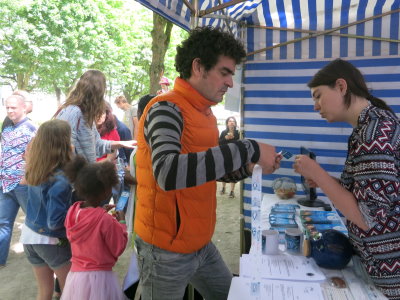 Conclusión: sí, es posible luchar contra la pesca excesiva y las prácticas criminales en la pesca. La investigación está produciendo valoraciones independientes que los ciudadanos, los gobiernos y las empresas pueden usar para cambiar la corriente. Y sí, los ciudadanos pueden contribuir de manera significativa revertir la situación a través del compromiso político, el consumo atento y ayudando a reducir los residuos en todas sus formas. Las instituciones públicas y las empresas tienen la responsabilidad particular de hacer cumplir y aplicar la legislación vigente y de no obstaculizar aún más la nueva disciplina antisubvención que se acerca a la adopción en la Organización Mundial del Comercio (OMC). Lo local afecta a lo global y viceversa. Por lo tanto, vale la pena participar también a nivel individual..
Conclusión: sí, es posible luchar contra la pesca excesiva y las prácticas criminales en la pesca. La investigación está produciendo valoraciones independientes que los ciudadanos, los gobiernos y las empresas pueden usar para cambiar la corriente. Y sí, los ciudadanos pueden contribuir de manera significativa revertir la situación a través del compromiso político, el consumo atento y ayudando a reducir los residuos en todas sus formas. Las instituciones públicas y las empresas tienen la responsabilidad particular de hacer cumplir y aplicar la legislación vigente y de no obstaculizar aún más la nueva disciplina antisubvención que se acerca a la adopción en la Organización Mundial del Comercio (OMC). Lo local afecta a lo global y viceversa. Por lo tanto, vale la pena participar también a nivel individual..
2. Contaminación
La segunda amenaza muy grave para la salud de los océanos es la sobrefertilización generalmente más seria en los mares semicerrados provocada por las escorrentías agrícolas y de las aguas residuales urbanas no tratadas, que crean grandes zonas muertas. Éstos aparecen por ejemplo en el Báltico y el Mar Negro porque el agua dulce altamente cargada con nitratos y fosfatos de la fertilización excesiva provoca la proliferación de algas en el mar. Los cuerpos muertos de las algas se hunden hasta el fondo donde son digeridos por bacterias y hongos que consumen todo el oxígeno disponible en el proceso. Cuando el oxígeno es escaso, sólo pueden sobrevivir microorganismos especializados, por ejemplos los que viven del sufor o del metano como fuente de energía pueden sobrevivir, mientras que los peces y otros animales móviles se moverán fuera del área. Estas áreas se llaman zonas muertas debido a sus condiciones de amenaza para la vida.
El tipo de contaminación más en el ojo público es, por supuesto, la contaminación plástica. Hemos informado regularmente sobre ello desde 2012 y las poderosas imágenes de botellas de plástico ahogando ríos particularmente en Asia y las bolsas de plástico sofocando las tartarugas en peligro de extinción han capturado la imaginación de muchas personas. Muchos visitantes del stand confirmaron que ya habían reducido o abandonado el uso de bolsas de plástico unidireccionales y buscaron otros medios y maneras de evitar que más plástico se introdujera en el océano.
The type of pollution most in the public eye is, of course, plastic pollution. We have reported regularly about it since 2012 and the powerful images of plastic bottles choking rivers particularly in Asia and plastic bag suffocating endangered turtles have captured many people's imagination. Many visitors at the stand confirmed they already reduced or abandoned use particularly of one-way plastic bags and sought other means and ways to prevent more plastic getting into the ocean.
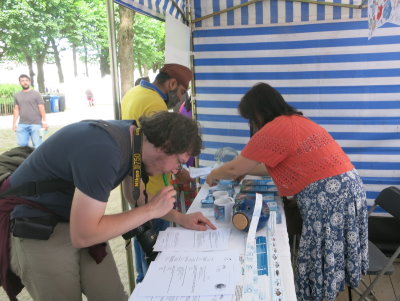 Conclusión: Hacer algo contra la contaminación plástica de las playas, ayudar en las limpiezas, y también tomar medidas prácticas de reducir sus propias emisiones de CO2 para la protección del clima fue una parte recurrente de las conversaciones y de las promesas que varios visitantes anotaron como un firme compromiso hacia el océano. Sí podemos, pero se requiere un gran esfuerzo para cambiar nuestros caminos. Algunos cambios en curso en las prácticas agrícolas y los esfuerzos de los ciudadanos, así como las empresas que escuchan el mensaje en favor de embalajes reducidos de productos y otros cambios apuntan en la dirección correcta. ¡Es hora de avanzar mucho!
Conclusión: Hacer algo contra la contaminación plástica de las playas, ayudar en las limpiezas, y también tomar medidas prácticas de reducir sus propias emisiones de CO2 para la protección del clima fue una parte recurrente de las conversaciones y de las promesas que varios visitantes anotaron como un firme compromiso hacia el océano. Sí podemos, pero se requiere un gran esfuerzo para cambiar nuestros caminos. Algunos cambios en curso en las prácticas agrícolas y los esfuerzos de los ciudadanos, así como las empresas que escuchan el mensaje en favor de embalajes reducidos de productos y otros cambios apuntan en la dirección correcta. ¡Es hora de avanzar mucho!
3. Cambio climático
Este mega reto estuvo muy presente en la mente de la gente en el Festival. Muchos visitantes de nuestro stand habían oído hablar de la abundante decoloración de los corales e incluso su muerte como resultado del calentamiento de las aguas superficiales del océano. Hemos informado repetidamente en nuestras redes sociales sobre las amenazas particularmente graves a la Gran Barrera de Coral de Australia, pero también a otras partes de los mares tropicales.
Lo que muchas personas no son tan conscientes hasta ahora es que más allá del nivel del mar que se eleva por el calientamiento, ya en si suficientemente fuerte como un efecto omnipresente y medible, el nivel de oxígeno de las aguas más cálidas es mucho menor que en aguas más frías. Ya observamos que los peces más grandes que necesitan aguas bien oxigenadas están evitando mares más cálidos como resultado. El efecto combinado de agua más caliente y menos oxígeno en el mar ya conduce a un movimiento hacia los polos de muchos animales marinos móviles que buscan mantenerse dentro de sus condiciones ambientales preferidas. A veces no funciona, porque necesitan agua poco profunda y no pueden vivir en aguas más frías pero más profundas o golpean contra una masa de tierra continental y están atrapados ... Estas son sólo un par de razones, por qué los ecologistas temen grandes pérdidas de biodiversidad como resultado del cambio climático (véase también el texto inspirador del concurso juvenil de este año para los premios Mundus maris).
Otro efecto, todavía infravalorado, del cambio climático es la acidificación de los océanos. Ocurre porque el océano ya ha absorbido muchas de las emisiones de CO2 provocadas por las actividades humanas. De lo contrario el calentamiento incluso sería más pronunciado de lo que ya es. El CO2 en el agua es un ácido ligero. Reduce el pH del agua de mar hasta un punto en el que los organismos con esqueletos calcáreos necesitan gastar más energía para mantenerse vivos y crecer.
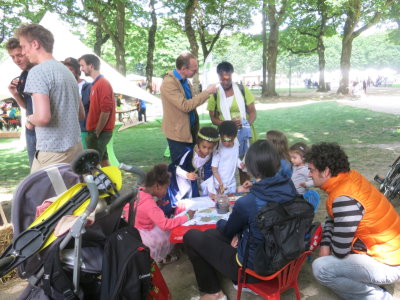 Experimentos y observaciones en el océano han permitido establecer un calendario tentativo de reducción del crecimiento y la disminución de diferentes organismos marinos con esqueletos calcáreos si la acidificación continúa sin disminuir. No es una perspectiva tranquilizadora. Quizás lo más preocupante es la amenaza a las algas marinas que producen el oxígeno de cada segundo aliento que tomamos.
Experimentos y observaciones en el océano han permitido establecer un calendario tentativo de reducción del crecimiento y la disminución de diferentes organismos marinos con esqueletos calcáreos si la acidificación continúa sin disminuir. No es una perspectiva tranquilizadora. Quizás lo más preocupante es la amenaza a las algas marinas que producen el oxígeno de cada segundo aliento que tomamos.
Conclusión: La conciencia es razonablemente alta, lo que es importante porque muchos aspectos del debate sobre el clima fueron abordados ampliamente en los principales medios de comunicación. El interés de aprender más es grande, especialmente en efectos menos conocidos SOBRE el océano.
El desafío es expandir las promesas de contribuciones para ayudar al océano, deteniendo el uso de bolsas de plástico, reducir las botellas de plástico y otros plásticos y hacer ajustes a la vida cotidiana que reducen las emisiones de gases de efecto invernadero.
Participar en la vida política para conseguir que los grandes productores de emisiones cumplan con la agenda de París limitando el cambio climático a menos de 2 ° C de calentamiento: se trata de la agricultura, el tráfico individual (por lo tanto, principalmente la industria automotriz y el cambio a formas de mobilidad más colectivas o libre de emisiones, calefacción / enfriamiento de los edificios, y finalmente obtener del transporte marítimo, responsable de seis por ciento de las emisiones globales, que reduzca drásticamente su huella.
Buenas interacciones
A lo largo del día, el equipo de miembros y voluntarios de Mundus maris tuvo buenas interacciones con los visitantes. Muchos participaron en el concurso de océanos y el ganador sólo se anunció a las 18h porque la demanda de participación no se detuvo antes. Varias personas también hicieron promesas para el océano y algunas quisieron contribuir específicamente a la concienciación y protección del océano con sugerencias que estamos felices de seguir.
El entusiasmo incansable de los niños por salpicaduras de agua en las mascotas Mundus maris, Samba y Kumba, dio un respiro a los padres y produjo una decoración verdaderamente colorida para el stand. Jóvenes amantes del océano vengan adelante a disfrutar de su belleza aún mañana.
Lea aquí los ganadores de los Premios Mundus maris de este año. Felicitaciones a los ganadores ya todos los participantes, así como a todos los profesores, a los partidarios y al jurado internacional que han contribuido a que el concurso juvenil vuelva a ser un gran éxito.
Las fotos fueron hechas por CE Nauen a menos que se indique lo contrario.
World Oceans Day in Yoff, Senegal, with kids questioning fishers about marine ecosystems
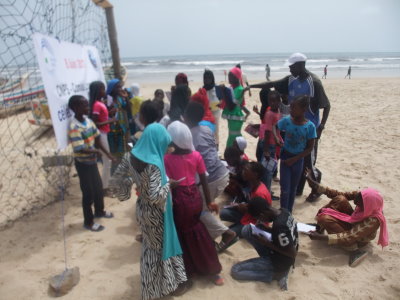 The local fishermen's committee, part of the National Collective of Fishermen in Senegal (CNPS), and the El Hadj Talla Diagne primary school celebrated World Oceans Day on 8 June 2017 in the fishing village of Yoff.
The local fishermen's committee, part of the National Collective of Fishermen in Senegal (CNPS), and the El Hadj Talla Diagne primary school celebrated World Oceans Day on 8 June 2017 in the fishing village of Yoff.
The fishers wanted use the Day for a clean up of the beach as a mark of their respect for the sea and recognition of its importance for their livelihoods. The beach had acculmuated unhealthy levels of pollution with household waste such that the fishers under the leadership of one of their members in the Environment Committee of the municipality decided enough was enough. This situation of insalubrity created manifold negative impacts directly felt by the population, for example difficulties for the fishers to repair their nets on the beach.
The extent of littering was such that even the favourite sport of the young people, beach soccer, could only be played with difficulties. Thus the call for the beach clean-up met with a good response. Afterwards, the group of young people between the ages of 10 and 12 years helping with the clean up took immediate advantage by playing an unimpeded match.
This cleaning operation took place early in the morning between 9:00 and 10:30 despite ramadan. Subsequently, with the coordination of Mr Mamadou Mbaye, chairman of the local fisheries committee, the local committee, in the presence of the president of the Mundus maris Club - Senegal, met under the shelter arranged on the beach. The shelter is the meeting place for fishers, where the discuss all problems of the community. The aim of this small meeting was to prepare the arrival of the pupils of El Hadji Diagne school.
What did the school contribute? Indeed, this school, which wanted to celebrate June 8, World Oceans Day, for the first time had the following programme:
1. It started with a meeting of its pedagogical team under the supervision of the director Mrs Ndiaye;
2. During a preparatory phase for the descent of the pupils onto the beach to meet the fishermen these young people have prepared their burning questions and which they intended to pose, in particular the pollution of the littoral. During this session, students divided up the questions;
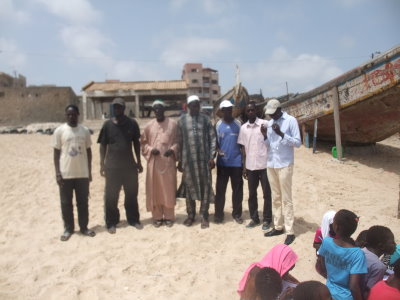 3. A briefing of the pupils participating in the day: explanation in class about why World Oceans Day is organised. This part was assured thanks to the unwavering commitment of the teachers Messrs Dial Samb (master of CMI) and Pape Ndiaga Wadj (master of CEII). It was on this occasion that the inspirational text (designed for the needs of the international youth contest on the Mundus maris website) was explained by these two teachers. This was followed by a drawing session by the students on the topic of pollution of the oceans;
3. A briefing of the pupils participating in the day: explanation in class about why World Oceans Day is organised. This part was assured thanks to the unwavering commitment of the teachers Messrs Dial Samb (master of CMI) and Pape Ndiaga Wadj (master of CEII). It was on this occasion that the inspirational text (designed for the needs of the international youth contest on the Mundus maris website) was explained by these two teachers. This was followed by a drawing session by the students on the topic of pollution of the oceans;
4. Another part of the celebration was devoted to an innovative tripartite exchange between teachers, pupils and fishers about the teaching materials of the Ecosystem Approach to Fisheries (EAF). This sequence took place in the shelter of the fishers. The exercise benefited from the facilitation of the Mundus maris representative, who had contributed to the development of the teaching kit. He explained the key principles of EAF and illustrated by means of the fish ruler the importance of respecting the minimum size at sexual maturity of the target fish species if we want to make the fishery a socially, economically and environmentally sustainable activity;
5. Finally, to close the day, while they were in the shelter of the fishers, the pupils asked their questions, which were answered by the fishers. Whenever necessary, the representative of Mundus maris provided explanations to some technical questions relating to the EAF. He illustrationed the replies with examples to make sure they be understood by the pupils.
The pupils chosen by the school to ask these questions were: Fatoumata SY, Bousso DIOP, Ndella NDIAYE, Ndeye Maty GAYE, and Khady DIALLO. They were all girls. The latter is the "Minister of Environment" within a "government" set up within the school. As a reminder, El Hadj Talla DIAGNE school is part of three pilot schools in Senegal where "governments" are set up with a president and ministries.
El Día Mundial de los Océanos en Buenos Aires, Argentina
 Puede pensar primero en el tango, el gaucho Don Segundo Sombra, la gran carne, los vinos, la oja y la Tierra del Fuego cuando se piensa en la Argentina. Pero el viernes 9 de junio, la Universidad de Belgrano, Buenos Aires y Mundus maris se unieron para celebrar el Día Mundial de los Océanos por primera vez en esta ciudad. Al evento asistieron varios oradores de diferentes organizaciones y especialistas que compartieron su amplia gama de conocimientos y - desde sus diferentes perspectivas - expresaron su compromiso con la protección del medio marino.
Puede pensar primero en el tango, el gaucho Don Segundo Sombra, la gran carne, los vinos, la oja y la Tierra del Fuego cuando se piensa en la Argentina. Pero el viernes 9 de junio, la Universidad de Belgrano, Buenos Aires y Mundus maris se unieron para celebrar el Día Mundial de los Océanos por primera vez en esta ciudad. Al evento asistieron varios oradores de diferentes organizaciones y especialistas que compartieron su amplia gama de conocimientos y - desde sus diferentes perspectivas - expresaron su compromiso con la protección del medio marino.
La audiencia estuvo representada mayoritariamente por estudiantes de cinco universidades. El principal propósito del encuentro fue acrecentar la conciencia, en especial en las generaciones más jóvenes, sobre la importancia del Mar Argentino tanto para la economía del país, así como para la protección del sistema de vida de los océanos, en interdependencia con los sistemas de vida continentales. El énfasis estuvo puesto en la necesidad de alcanzar desarrollos más sostenibles, los cuales permitan mantener las fuentes laborales al mismo tiempo que garanticen la conservación de la invaluable naturaleza que caracteriza a una de las zonas más ricas del Océano Atlántico.
Al comienzo del evento, tras las palabras inaugurales de la Dra. Lilián Ferré, en representación del Rector y del Decano de la Facultad de Ciencias Exactas y Naturales, se proyectó el video institutional del evento recordando al escritor argentino Jorge Luis Borges.
 A continuación, la presidente de Mundus maris, Dra. Cornelia E Nauen, tomó la palabra poniendo el énfasis en las tres principales amenazas que sufren hoy los océanos: la sobrepesca, la contaminación y el cambio climático. Alentó las medidas correctivas de lo local a lo global para superar las amenazas. Subrayó que todos pudieran y deberían hacer algo para devolver al océano todos los bienes y servicios que ya había proporcionado a los seres humanos.
A continuación, la presidente de Mundus maris, Dra. Cornelia E Nauen, tomó la palabra poniendo el énfasis en las tres principales amenazas que sufren hoy los océanos: la sobrepesca, la contaminación y el cambio climático. Alentó las medidas correctivas de lo local a lo global para superar las amenazas. Subrayó que todos pudieran y deberían hacer algo para devolver al océano todos los bienes y servicios que ya había proporcionado a los seres humanos.
Seguidamente, el Lic. Gabriel Blanco, del INIDEP, explicó la importancia del programa de observadores a bordo como así también de las campañas de investigación para conocer el estado de los recursos marinos. El Lic. Guillermo Cañete, de Fundación Vida Silvestre, compartió las acciones que están llevando a cabo para lograr la creación de cinco áreas protegidas marinas en el Mar Argentino.
El Biólogo Aníbal Seleme, de FAPBIO, disertó sobre las malas conductas humanas ante la aparición de mamíferos marinos en las playas, con ejemplos concretos, y cómo se debe educar para revertir dichas conductas.
 En Argentina, a diferencia de otros países de América Latina, se practica la pesca deportiva. El Club de Pescadores de Buenos Aires, representados por su presidente, CPN Ángel Colombo, y dos miembros de la Comisión Directiva, Lic. Magdalena Contreras e Ing. Leandro Gurruchaga, describieron las actividades educativas del club para promover la pesca deportiva con devolución, como así también las acciones emprendidas para lograr la sanción de leyes que tornen obligatoria dicha práctica.
En Argentina, a diferencia de otros países de América Latina, se practica la pesca deportiva. El Club de Pescadores de Buenos Aires, representados por su presidente, CPN Ángel Colombo, y dos miembros de la Comisión Directiva, Lic. Magdalena Contreras e Ing. Leandro Gurruchaga, describieron las actividades educativas del club para promover la pesca deportiva con devolución, como así también las acciones emprendidas para lograr la sanción de leyes que tornen obligatoria dicha práctica.
La Dra. Patricia Morales de la Universidad católica de Lovaina y presente de Terra curanda mostró otra faceta de la lucha por la vida en los mares, en referencia al refugio que muchas personas buscan en otras partes del planeta, surcando las difíciles aguas que separan los continentes.
El Maestro Gonzalo Álvarez expresó cómo a través del arte busca lograr que los niños descubran su amor por la naturaleza y la vida.
Sabemos que la forestación contribuye a mitigar la acidificación de los océanos. El Lic. Manuel Szwarc compartió las acciones concretas de forestación con árboles nativos emprendidas por la organización Árboles sin fronteras. La Dra. Carolina Luchetti, de AGCB, dio luz sobre la magnífica oportunidad que brindan estos encuentros para compartir ideas y conceptos en beneficio de nuestro planeta.
La jornada fue conducida por el Dr. Marcelo Morales Yokobori, a cargo de las cátedras Recursos Marinos y de Ecología y Conservación, organizadoras del evento.
De esta manera, el encuentro se hizo eco del mensaje del Secretario General de Naciones Unidas, Don António Guterres, quién expresó que el Día Mundial de los Océanos proporcionaba una oportunidad importante para promover un futuro sostenible.
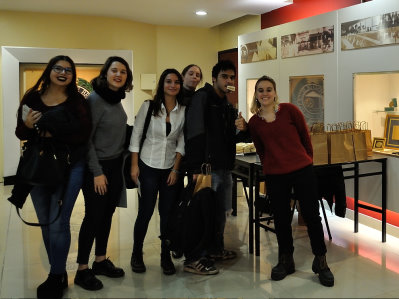 En una gran metrópoli como Buenos Aires, lejos del mar propiamente dicho pero vinculado al mismo a través del Estuario del Plata (el Mar Dulce como le decimos metafóricamente) compartido con la República del Uruguay, resultan necesarias acciones que acrecienten la conciencia sobre la importancia de los océanos para la vida de todo el planeta.
En una gran metrópoli como Buenos Aires, lejos del mar propiamente dicho pero vinculado al mismo a través del Estuario del Plata (el Mar Dulce como le decimos metafóricamente) compartido con la República del Uruguay, resultan necesarias acciones que acrecienten la conciencia sobre la importancia de los océanos para la vida de todo el planeta.
Pero la información no alcanza facilmente, y en palabras de uno de los oradores de este evento, el biólogo Guillermo Cañete, se hace necesario un camino desde la razón hacia el sentimiento. Sentirse parte del problema y de su solución, y no un mero espectador, se hace necesario para cumplir con los objetivos de la Agenda 2030 para el Desarrollo Sostenible.
Hacia el final del evento se entregaron los certificados a los disertantes, con palabras de cierre de la Dra. Lilián Ferré, seguido de un agasajo invitación de Mundus maris.
Nuestro profundo agradecimiento a la Universidad de Belgrano, y especialmente al Dr. Hernán Aldana Marcos, decano de la Facultad de Ciencias Exactas y Naturales, y al formidable equipo de estudiantes de la carrera de Biología por hacer posible este evento.
Texte por el Dr Marcelo Morales Yokobori, fotos de Paula, Constanza y Juan Marco.
World Oceans Day in Douala, Cameroon
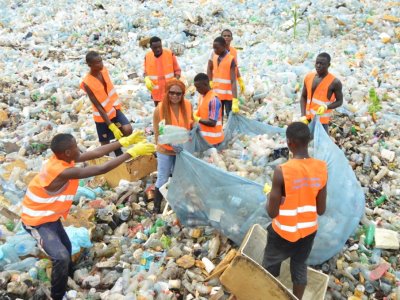 by Jeauberte Djamou, Bénévoles des Océans, our partner in Cameroon
by Jeauberte Djamou, Bénévoles des Océans, our partner in Cameroon
1. Our human investment into a livable environment
As a prelude to the celebration of World Oceans Day on June 8th we organised a human investment session on June 4, 2017 in a river in the heart of the city of Douala, at the place called Billongue.
We chose this river because the city drains all its waste waters and garbage into its bed. Therefore it was imperative and true to the objectives of our association that our action be carried out specifically in this place.
The activity took place on June 4th from 7am in the presence of some thirty young people. A priori this place has all the characteristics of a dump of plastic bottles. Even though we obviously have to do with a river, the clogging by all kinds of waste has forced the original river to change its bed.
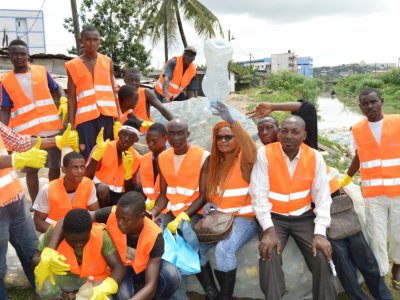 Our action on the ground was mainly to clean up this riverbed from the waste that encumbered it and made the water foul in order to make the environment livable again.
Our action on the ground was mainly to clean up this riverbed from the waste that encumbered it and made the water foul in order to make the environment livable again.
We were shocked by the extent of the degradation. We have done a remarkable job during the clean-up. But as no proper waste management plan seems to exist, we will continue to mobilise for a more structured solution.
We fear that otherwise our one-time effort will not have the expected effects and that similar problems will continue to exist in this and other places in Douala.
2. The celebration
The gathering took place in front of the offices of the Governor of the Littoral with 150 children of the pilot schools of Douala in attendance.
They sang the song of Vivien AKOA, winner of a Mundus maris Awards Shark Prize 2017 for about thirty minutes; Stop that, the pollution ..., before starting the march towards the Delegation of Tourism and Leisure where the festivities took place in the presence of the administration of the Littoral.
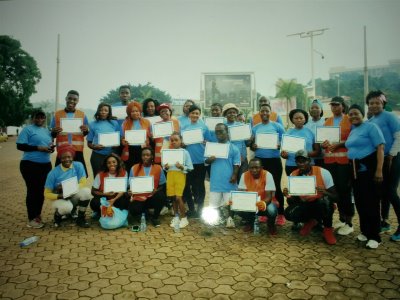 After the speech of Mr Samvam Yara, Head of the Economic, Social and Cultural Affairs Division of the Littoral Region, representing the Governo, who was prevented from participation due to another commitment, we issued the honorary diplomas of participation in the Mundus maris Awards youth contest 2017.
After the speech of Mr Samvam Yara, Head of the Economic, Social and Cultural Affairs Division of the Littoral Region, representing the Governo, who was prevented from participation due to another commitment, we issued the honorary diplomas of participation in the Mundus maris Awards youth contest 2017.
The Head of administration handed the diplomas out to the participants present.
It is also an opportunity to thank the Honorable Paul Eric Djomgoue, Deputy of Nfoundi, for his support, as well as the City Council of Douala III and the Autonomous Port of Douala.
3. Closure
The Oceans Volunteers of Cameroon concluded the activities related to the celebration of the World Oceans Day by a sporting walk of about 15 km in the district of Yaoundé II. Some sixty volunteers participated.
On a cool morning, the departure took place at the esplanade of the Sub-Prefecture of Tsinga. After a photo shoot at the esplanade of the Yaounde Congress Center we launched our walk under the curious glances of the passers-by.
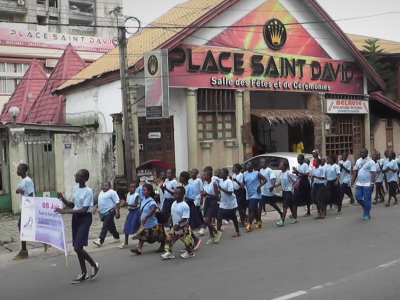 At the halfway point we held a stretching session and then continued our journey.
At the halfway point we held a stretching session and then continued our journey.
After three hours of clock time, we returned to the Esplanade of the Sub-Prefecture where we received the Honorary Diplomas for the participation in the contest for the Mundus maris prize on the protection of the oceans of the applicants and parents of children who could not be present at the earlier ceremony. A family photo was taken as a souvenir.
We finally joined the Volunteer Headquarters where awards were presented to the winners. We have developed a road map for the continuation of our activities. The winners are very happy with the firm conviction to work for the protection of the oceans and to attract the maximum number of young people to the group.
NB: Even the Commissioner in charge of the escort has become a volunteer!
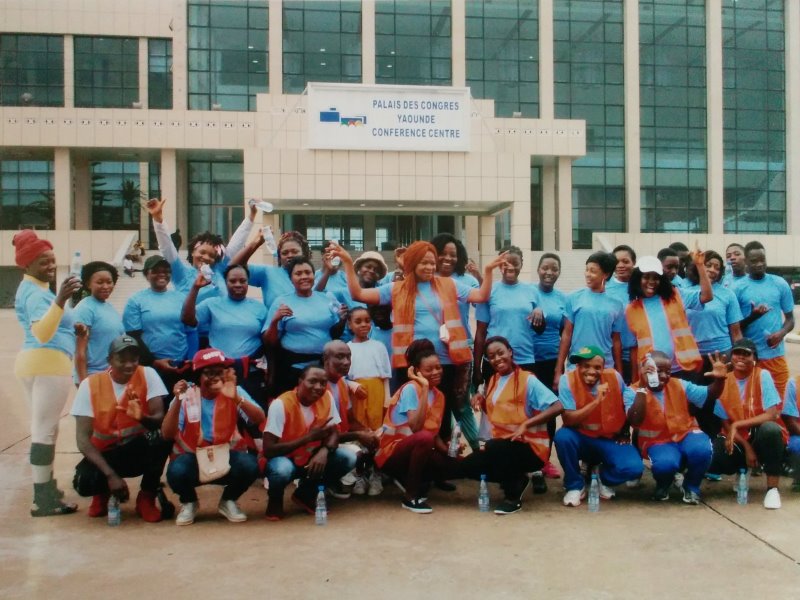
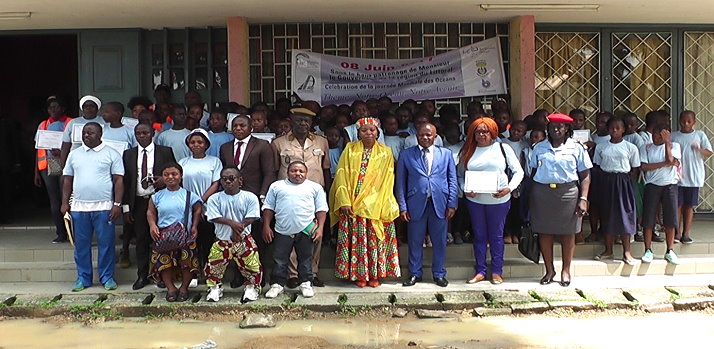
The Friendly of soccer schools and Mundus maris celebrating in Hann, Senegal
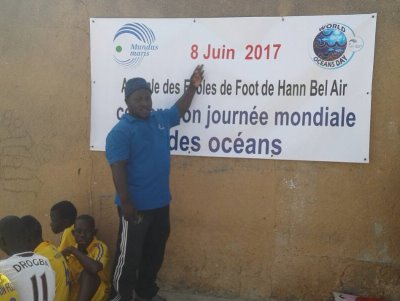 The leaders of the sporting world of the fishing community of Hann celebrated World Oceans Day, 8 June together with Mundus maris.
The leaders of the sporting world of the fishing community of Hann celebrated World Oceans Day, 8 June together with Mundus maris.
Unlike previous editions organised by the soccer school "Maison Foot", the one of 2017 was initiated by the “Friendly” grouping all 12 soccer training schools in Hann.
According to the persons in charge, the importance of their involvement in any initiative favourable to the conservation and protection of the environment in general and of the oceans in particular is justified.
They cite, among other things, the ability to convey messages through sports activities to the people, especially the young ones (see interview with Alassane Diallo, communication chief of the soccer school "Maison Foot").
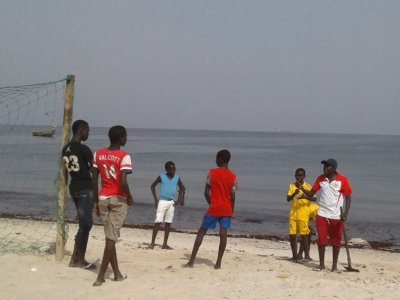 The programme for the day was set as follows:
The programme for the day was set as follows:
-
organisation of upgrading sessions in training centers for the benefit of pupils - trainers on the Mundus maris association, its objectives and the merits of the Day
-
beach cleaning;
-
a beach soccer tournament once the beach was cleaned up.
At the end of the tournament, the first four teams went through to the semi-final and final stages. The training centers "Maison Foot" and "Challenge Foot" competed in the final. Challenge Foot in blue outfit won.
The president of the Mundus maris Club Senegal awarded the trophies but especially food to the recipients. It should be pointed out here that because of the particular contest coinciding with the month of Ramadan, our interlocutors in the schools had deemed it necessary to provide rewards in the form of foodstuffs, thus enabling all the participating teams to have enough to break the fast at their ease after sunset.
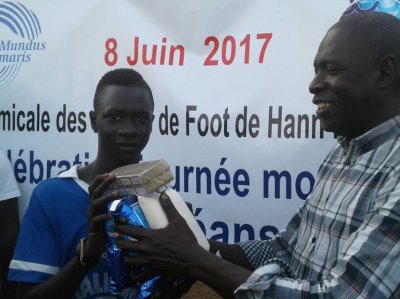 In terms of lessons to be learned and future prospects agreed upon at the end of the 2017 edition, the following emerged:
In terms of lessons to be learned and future prospects agreed upon at the end of the 2017 edition, the following emerged:
-
The idea of working with the “Friendly of soccer schools” holds greater potential for the future. In this context, we owe a special recognition to the Centre "Maison Foot", which for some years already has collaborated with Mundus maris for World Oceans Day and has played this time a catalytic role in having succeeded in mobilising the other training centers around the event;
-
In the opinion of some leaders of the "Friendly", for a more sustained effort in convening the tournament and promoting ocean protection, the collaboration should not be a one-off event in a day dedicated to the oceans. In their view, they would like Mundus maris to link with World Ocean Day organisers so that educational materials (films, posters about the environment in general and oceans in particular) can be made available to them, so that these centers can integrate these into their training curriculum. It may be necessary to recall here that the training centres provide the same courses as those in primary schools at the same time as offering soccer training. This strategy aims to give young people who have not broken through in football a chance to continue their education in high school after the CM2, if necessary.
World Ocean Day organised by Mundus maris at FUTA Staff Secondary School, Akure, Ondo State, Nigeria
by Oke Israel, FUTA
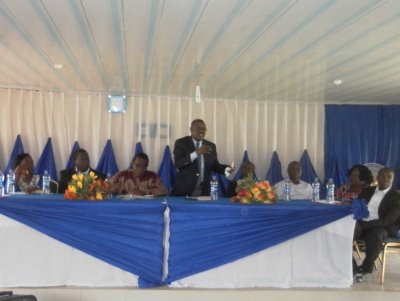 The programme started with the arrival and registration of guests from 9:30am to 10:00am on 8 June 2017.
The programme started with the arrival and registration of guests from 9:30am to 10:00am on 8 June 2017.
The opening prayer was said by Mr Ajayi (FUTA Staff School), this was followed by introduction of the guests and participants by Miss Imoru Ruth (FUTA Protocol officer). Some of the participants introduced to the high table included, Prof. O.A.Fagbenro (The Chairman), Prof. L.C. Nwana (Former HOD, FAT Department, FUTA), Dr. J.B. Bolarinwa (Lead paper presenter), Mr. Ikuyinminu (Principal, FUTA Staff School), Mrs Adekanbi (FUTA Staff School Vice Principal, Academics and LOC Member), Mr Ajakaye (FUTA Staff School Agriculture teacher and LOC member) and Mr Ajayi (FUTA Staff School Vice Principal, Administration).
This was followed by the chairman address from the chairman of the day, Prof. O.A. Fagbenro. Goodwill and welcome address was delivered by Mr. Anthony Ikuyinminu (Principal, FUTA Staff Secondary School).
He welcomed all the participants and highlighted the importance of the ocean to sustaining lives on Earth. He also emphasised the timely theme of this year ocean day tagged "Our Ocean; Our Future". The Principal, FUTA Staff Secondary School, concluded that the importance of the ocean can not be overemphasised especially for the sake of posterity.
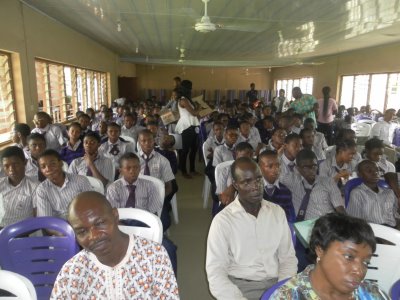 The lead presentation titled "Our Ocean: Our Future" was delivered by Dr. J.B. Bolarinwa from the Department of Fisheries and Aquaculture Technology, The Federal University of Technology, Akure, Nigeria. Some of the highlights of his updated key points are as follows:
The lead presentation titled "Our Ocean: Our Future" was delivered by Dr. J.B. Bolarinwa from the Department of Fisheries and Aquaculture Technology, The Federal University of Technology, Akure, Nigeria. Some of the highlights of his updated key points are as follows:
-
The World Oceans or global ocean (colloquially called the Sea) is the interconnected system of Earth’s oceanic waters and comprises 71% of the combined surface of the planet covering about 361 million km2.
-
The ocean is rich in marine resources and it is assumed that life originated in the oceans leading to all living organisms on land and water today: bacteria, plants, animals including humans. Different aquatic fauna and flora derive different resources from marine biome. The most valuable natural resources can be found in the oceans. These include food in form of fish, shellfish and aquatic weeds. According to the catch reconstructions of the Sea Around Us Project, current human extractions from the ocean are estimated to have peaked at about 130 million tons in 1996, declining ever since, particularly in the industrial segments of fisheries (Pauly and Zeller, 2016, 2017) (1).
-
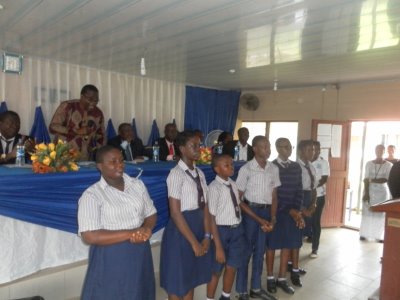 The ocean removes carbon from the atmosphere and provides oxygen through the photosynthetic activities of aquatic algae. The ocean has the capacity to collect, drive, mix water heat and carbon dioxide. It can hold and circulate more water heat and carbon dioxide than the atmosphere. Massive uptake of anthropogenic CO2 emissions is leading not only to thermic expansion of the ocean as a result of warming, but also reduction in oxygen content (warmer water contains less dissolved oxygen) and acidification.
The ocean removes carbon from the atmosphere and provides oxygen through the photosynthetic activities of aquatic algae. The ocean has the capacity to collect, drive, mix water heat and carbon dioxide. It can hold and circulate more water heat and carbon dioxide than the atmosphere. Massive uptake of anthropogenic CO2 emissions is leading not only to thermic expansion of the ocean as a result of warming, but also reduction in oxygen content (warmer water contains less dissolved oxygen) and acidification. -
Overfishing of Nigerian territorial waters have also been reported by various authors due to poaching, poor implementation of fisheries policies, poor enforcement of fishing laws and regulations and high anthropogenic pressure on the waters. Pollution and climate change constitute further strain on ocean health (Bolarinwa et al., 2016 ) (2).
-
There is a need to know the pollution status of Nigerian marine waters and the extent of loss of biodiversity. Marine organisms such as marine algae, plants, worms, corals, echinoderms (star fish), crustaceans, cephalopods (squids and octopus), commercial reef and deep sea fishes, sharks, marine birds, sea reptiles and turtles and marine mammals (whales) are becoming threatened and endangered, hence the need for the government to commit more funds to research on pollution, surveillance surveys, biomass estimates and marine protection.
The keynote and lead paper presentation was followed by the question and answer session, students and participants asked various questions about the lead topic. The questions were answered by Prof. Fagbenro, Prof Nwanna and Dr Bolarinwa.
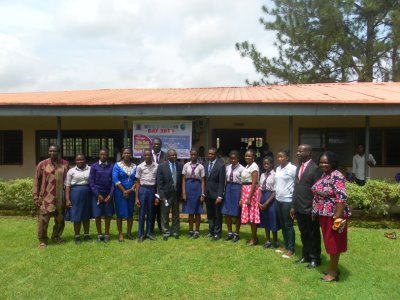 Immediately after this session, the Mundus maris awardees were recognised by the chairman, Prof. O.A. Fagbenro. He called the names of the seven awardees all from FUTA staff secondary school - congratulations!
Immediately after this session, the Mundus maris awardees were recognised by the chairman, Prof. O.A. Fagbenro. He called the names of the seven awardees all from FUTA staff secondary school - congratulations!
Furthermore, Prof Fagbenro promised tuition scholarship to anyone of the awardees that wish to study any course related to Ocean resources management in any Nigerian university.
Finally, the vote of thanks was given by Dr. O.K. Gbadamosi, who appreciated all participants, lead speakers and guests for the making the year 2017 World Ocean Day (WOD 2017) celebration a success in FUTA. The Closing prayer was said by Mr .Ajakaye (FUTA Staff Secondary School). This was immediately followed by the photo session. The group photo shows the awardees with the guests.
(1) Pauly, D. and D. Zeller, 2016. Catch reconstructions reveal that global marine fisheries catches are higher than reported and declining. Nature Communications, DOI: 10.1038/ncomms10244, and
Pauly, D. and D. Zeller, 2017. Comments on FAOs State of World Fisheries and Aquaculture (SOFIA 2016). Marine Policy, 77:176-181.
(2) Bolarinwa, J.B., A.A. Ogunbona, O.J. Ishola and F.O. Ogundana, 2016. Socioeconomic Survey and Cost-Benefit Analysis of Artisanal Fisheries in Egbin Waterside, Lagos Lagoon, Lagos State, Nigeria. Int.J.Res.Agric.Forestry, 3(11):1-5.
World Oceans Day in Abbassa, Egypt
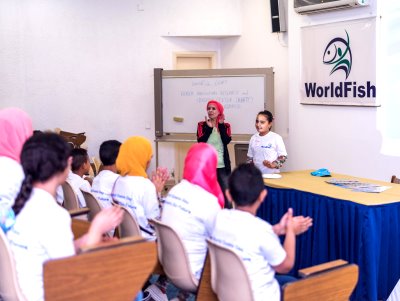 This year, we struck up a partnership with WorldFish Abbassa in Egypt for the first time and they celebrated wonderfully with an entire class of school children and their teachers, who were able to discover how science can contribute to sustainable food production from aquaculture.
This year, we struck up a partnership with WorldFish Abbassa in Egypt for the first time and they celebrated wonderfully with an entire class of school children and their teachers, who were able to discover how science can contribute to sustainable food production from aquaculture.
The idea was picked up by the Abbassa team as proposed by Dr. Lydia Adeleke Mosunmola, an AWARD Fellow of the Federal University of Technology in Akure who was at the WorldFish Center Abbassa, Egypt at that time for her Advanced Science Training organized by the African Women in Agriculture Research and Development (AWARD).
Due to Ramadan, the school preferred the excursion to celebrate World Oceans Day for the period afterwards.
Encouraged by WorldFish Country Director Malcolm Dickson, who also accepted to serve on the international jury for the Mundus maris Awards youth contest, Mona El Azzazy shouldered much of the preparatory work and mobilised several colleagues and collaborators to make the day memorable for the kids.
The happy faces of the family photo at the end show that the team succeeded well.
Congrats and let's continue next year!
